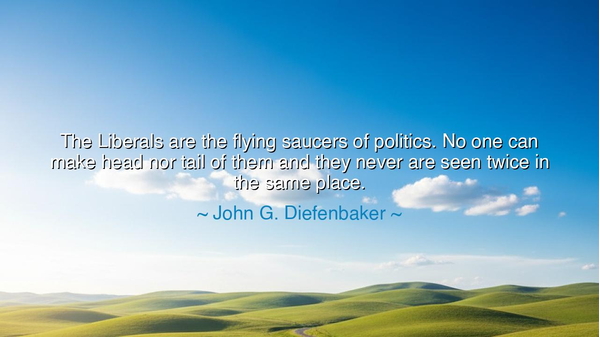
The Liberals are the flying saucers of politics. No one can make
The Liberals are the flying saucers of politics. No one can make head nor tail of them and they never are seen twice in the same place.






Hear now, O sons and daughters of wisdom, the words of John G. Diefenbaker, spoken in the tempest of politics, where clarity is often lost amidst the swirling mists of ideology. He spoke of the Liberals, those who wander like flying saucers, strange and elusive, never to be fully understood nor captured. "No one can make head nor tail of them," he said, for in their shifting nature and ever-changing principles, they resemble creatures from realms unknown—difficult to grasp and even harder to predict. Their form and purpose remain a mystery, a riddle to those who seek stability in the world of men.
In the ancient scrolls of history, many a leader has faced those who claim to hold the future in their hands but whose vision seems as fleeting as the winds. The Liberals in Diefenbaker’s time were like the shifting tides—at one moment fierce and unyielding, and at the next, they would recede into the fog. It is not that they lacked vision, but that their vision was often mutable, shifting like a dream seen through the veil of the night. And in such shifting, the people were left to wonder: were they being led by those of firm purpose, or were they simply swept along by the currents of change?
Consider the ancient Greeks, who in their wisdom built a mighty empire on the pillars of reason and democracy. Yet, even within their halls, there were those whose allegiances changed as quickly as the stars above. Such were the philosophers of their time—many who spoke with the voice of reason, but whose loyalties shifted with the winds of fortune. They, too, were elusive, at times casting shadows of doubt, at others, offering clarity. It is said that the wise man does not change with every breeze, for his course is true. But the Liberals, like the flying saucers of politics, appear in the skies, then disappear—leaving questions, but no answers.
The quote speaks to a timeless truth: that the principles of some are ever in motion, like the floating stars, elusive and distant. The Liberals in Diefenbaker’s day were seen as a party of contradiction—a group that stood for certain ideals but was unwilling to stand firm on them when the storm of politics raged. Their strength was in adaptation, but in that very adaptation, they risked losing the connection to the people’s hearts. Truth, it is said, is steady as a mountain, not shifting with every passing wind.
In this wisdom, let us reflect on the lesson passed down through time: in the realm of politics, as in life, those who seek power through the fickle currents of change may find themselves lost, their message obscured by the very clouds they ride upon. To stand with clarity, to be seen in the same place with the same principles, is the mark of true leadership. For it is only the leader with unwavering purpose who will guide the people through the fog, who will be seen clearly, and whose legacy will endure. The flying saucers may appear, but they shall never touch the ground.






Nnpmq
John G. Diefenbaker’s comparison of Liberals to flying saucers definitely makes you think about the perception of political consistency. But what about when a party needs to make bold, unexpected moves to address current challenges? Does unpredictability in politics always signal weakness, or can it sometimes be a sign of strategic innovation? How do we define what makes a political party ‘reliable’—is it consistency, adaptability, or something else entirely?
ALKim Anh Le
Diefenbaker’s analogy about Liberals and flying saucers paints them as mysterious and elusive, but I wonder if that’s a fair critique. Shouldn’t political flexibility be seen as a strength in an ever-changing world? Maybe what appears to be unpredictability is actually the party’s way of responding to complex and shifting issues. Is it possible that this metaphor oversimplifies the complexity of modern politics and the need for adaptability?
NQNguyen Ngoc Nhu Quynh
I find Diefenbaker’s comment about Liberals being like flying saucers a bit harsh. Is it fair to say that a political party can’t have differing viewpoints or evolving policies without being labeled as erratic or unclear? Can’t a party change and shift in response to new challenges? How do we ensure that political parties can adapt without being criticized for being ‘unpredictable’ or difficult to understand?
PTXuan Phuong Ta
Diefenbaker’s comparison of Liberals to flying saucers seems like a playful dig, but it raises an interesting point about the nature of political consistency. Is it necessarily a problem if a political party changes or adapts over time? Could their adaptability be mistaken for lack of direction? How do we distinguish between a party being flexible and responsive to the times versus being indecisive or inconsistent?
YYen
John G. Diefenbaker’s quote about Liberals being like flying saucers is both humorous and critical. It seems to suggest that their policies or actions are elusive or inconsistent. But is this a fair characterization? Don’t political parties, including the Liberals, evolve over time to adapt to changing needs? Could it be that their shifts are misunderstood or misinterpreted as unpredictability? Or is there a truth in the idea that their direction lacks clarity?